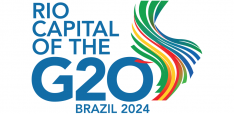Data Opens a New Frontier in China: An Interview with GGF 2027 Fellow Vincent Ni

This interview was conducted by Joel Sandhu for the Global Governance Futures – Robert Bosch Foundation Multilateral Dialogues, which bring together young professionals to look ahead and recommend ways to address global challenges. All views expressed here are his own.
There has been a lot of talk about 'big data.' What does that mean in China?
Well, big data is everywhere in China, from finance to governance. Nowadays if you talk to Chinese entrepreneurs and government officials, they will constantly drop this word into the conversation. It is a buzzword in China these days.
Indeed, given China’s sheer size and complexity, anyone who is interested in this area would find big data in China exciting. But without analytics, the data are useless. In other words, big data is not about the data per se, but about how to make sense of them and how they can be used to benefit our daily lives.
Another issue concerning big data in China is its ownership: Who owns our data? And where is the bottom line when it comes to privacy, for example? We are unlikely to see the Chinese equivalent of Apple take the intelligence agency to court, but how they negotiate and compromise also defines the relationship between Chinese tech companies and the Chinese government.
These are all complex issues, and they require some serious thinking amongst both policymakers and industry players in China.
As a journalist, you monitor a lot of online conversations. What do people in China hear and read about on a day-to-day basis?
Like netizens in other countries, many people in China care about matters related to their day-to-day lives and – perhaps – what can make them laugh. There are conversations about policy and politics, but they are not the mainstream – although this could also be the result of censorship.
It is also important to observe the language being used in the Chinese cyberspace – if you read Chinese, you will note that it is rather different from the language of official media. The latter being more formal, the former being livelier and sometimes coded to convey a political message.
For example, when referring to the rich and the powerful, netizens came up with this innocuous surname: Zhao(赵). You will constantly be surprised by the wittiness people show – an extension of the linguistic tradition in which direct expression or criticism is not possible.
China has been pushing for 'internet sovereignty' for a while. What does this mean? What are the latest developments?
It means that China wants to reaffirm the right to control the web traffic coming in and out of the country. To some extent, this can be seen as censorship, but it also reflects the way Beijing sees the internet, which has been widely understood as borderless since its inception. Beijing’s operation intensified after the Snowden revelations in 2013, when there was a lot of discussion about resisting the US dominance in technology and the internet in China.
It is a highly controversial idea in the West of course, but it seems China feels it is more than justified to do this, and many say China is also trying to promote its version of ‘internet management’ among policy makers in other parts of the world.
For example, according to China’s official Xinhua News Agency, Moscow has also joined Beijing to call for ‘internet sovereignty’; and it is reported that as this year’s host for BRICS summit, Beijing will push other BRICS nations to explore partnerships on cyber governance.
Let us wait and see how this will develop in the years to come as China’s influence grows both in the region and around the world.
Censorship is a problem in China, at least to outside observers. What are the alternatives to Facebook and Twitter in China? How are they received domestically?
Weibo is regarded as an alternative to Twitter – although it has arguably died down in recent years largely due to increasing scrutiny from the authorities.
And WeChat is a hybrid of all functions you can imagine, from Facebook-ish timelines to bots, and even online payment – you can basically live on them. In other words, they are not just copycats of their Western counterparts; each has been innovative in its own right.
The blockage of Facebook and Twitter is not making the lives of ordinary Chinese more difficult (although there are concerns about information security, among others). And it is interesting to see that WeChat, for example, is also trying to tap into an overseas market. They are now quite popular in Southeast Asia, India, and some countries in Africa.
But there are consequences for China’s internet population, too. Facebook, Twitter, and the like are the symbols of an open internet – or rather an open worldview. In this case, building a self-sufficient Chinese intranet might work domestically, but it limits the choices for those who prefer to use other tools.
You did some research on so-called internet addiction in China some time ago. Can you tell us more about it?
Yes, that was 10 years ago when I was in Beijing. Back then, internet was not as ubiquitous in the country as it is today.
The attempt to treat ‘internet addiction’ caused a lot of controversy after reports that some youngsters died after receiving treatment. Many kids were locked up in a boot camp, completely isolated from the cyber world, and some even received medication. (I am still not convinced the label ‘illness’ makes sense.)
Nowadays the internet has become an extension of our daily lives, so less and less people are trying to link constant use of the internet to ‘addiction.’
Together with other fellows, you have discussed the future of data governance during the GGF rounds at length. What, in your view, are some future trends for internet usage in China?
In our discussions across five cities, we met with policymakers as well as industry players in this area. It is clear that this is a topic that is still emerging, and the discussions of it differ from country to country.
For example, some countries are still talking about the disparity in internet infrastructure (i.e., India); and others (i.e., the US) are concerned more about privacy and citizens’ rights. I still remember this heated debate with our brilliant experts from the Brookings Institution in Washington, DC.
In China, the infrastructure seems to be well in place. The entire online population is now more than twice the size of that in the United States. Some of the challenges are common, though. As we are facing the increasing complexity of data governance, issues such as security and privacy will soon emerge as the central topics in this area in China.
We also have to answer the question of who, in China, controls data? How is the corporate-government relationship defined in this huge market? We are likely going to hear different voices on these issues in China at some point.
Vincent Ni is a senior producer with BBC World Service and a Global Governance 2027 fellow. The views expressed here are his own.
Photo credit: KamiPhuc via Foter.com / CC BY


